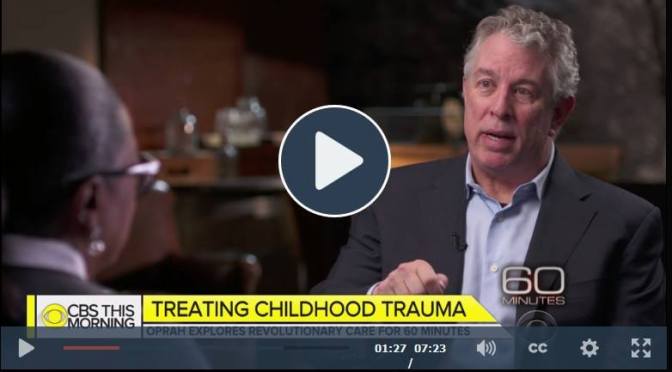.
“For me it was school, and teachers…”
Overall, this report was not so much about Oprah personally, nor her own life experience, but more about the phenomena (or, in a loose way, the ‘science’) of childhood trauma. She highlights the trauma-informed work being done at “SaintA” in Milwaukee, Wisconsin.
Oprah interviews Bruce Perry, M.D., Ph.D., who, is Founder and Senior Fellow of the ChildTrauma Academy, in Houston, Texas. Dr. Perry is considered one of the 3 or 4 leading researchers and practitioners in the world who are focused on trauma impacts in developmental stages (going the whole way back to the kids in the Waco fiasco and prior).
Dr. Perry made powerful points:
Children are more vulnerable to fear and stress than adults.
Childhood, when developing brains are physically forming, is the period of greatest sensitivity for the brain.
A child’s developing brain doesn’t ‘just get over it’. Unaddressed, trauma in children generates lifelong impacts, and can end in early death.
Dr. Perry was also crystal clear in bringing ‘relationships’ to the forefront as the counterpoint to traumatic stress in childhood.
Oprah was very clear on changing perspectives.
She did a great job emphasizing the change required to the perspective of adults in the way we try to understand — from the old, judgmental “What’s wrong with you?” to the more appropriate and enlightening question: “What happened to you?”
It’s a change based firmly in both science and practice, as described by Sandra Bloom, M.D., in context of her developmental work on The Sanctuary Model:
“We (the treatment team for Sanctuary) were in a team meeting sometime around 1991 on our inpatient unit, trying to describe the change that had happened to us in recognizing and responding to the issue of trauma, especially what has become known now as childhood adversity – as a causal issue for the problems of most of the people we were treating and Joe Foderaro, LCSW, always good at pithy observations, said “it’s that we have changed our fundamental question from “what’s wrong with you?” to “what happened to you?”. (Published in “Comments” section at ACEsConnection.com here )
(More in her book. Creating Sanctuary: Toward the Evolution of Sane Societies Revised Edition, page 195 )
Oprah’s investigative report for “60 minutes” reveals only the tip of the epidemic, but it’s a huge boost to the visibility of the issue. She also includes a very brief overview of Adverse Childhood Experiences (ACEs). Much more information is available: Click here and here.
CLICK on the blue text Links above and below for more information:
1) CBS ‘trailer’ for the report:
2) ‘Resilience’ and ‘Grit’ don’t matter while there is a hole in your soul…
https://www.cbsnews.com/news/oprah-winfrey-childhood-trauma-ptsd-60-minutes-report/
3) Oprah highlights the impact of her teachers and school on her life trajectory (on 60 Minutes Overtime.com). A much younger Oprah interviews one of her teachers. Oprah talks about the impact of her investigation for “60 Minutes” on her personal perspective of others and on the school ( Oprah Winfrey Leadership Academy for Girls) she funds in South Africa.
https://www.cbsnews.com/news/the-life-changing-story-oprah-reports-this-week/
4) Oprah’s full Report:
https://www.cbsnews.com/news/oprah-winfrey-treating-childhood-trauma/
5) More detail on the science and on the practice related to Developmental Trauma, at the link below:
Nowhere to hide: “The Elephant in the Classroom”
.
“Like” us at “Trauma-Informed Schools” on Facebook
.




I’m curious how you create a classroom culture where students are willing to open up to you about their trauma, especially with older students. I want to teach high schoolers and I know many of them will have experienced/be experiencing childhood trauma and be dealing with the long-term effects. How do you approach the issue with a closed-off teen? Do you wait for them to come to you? I feel like older students will respond differently to the added attention, so how do I go about this gently so that I don’t scare them off or make them feel infantilized?
LikeLiked by 1 person
Hi Julie. Great question!
I struggle with this myself. I hope that others reading your question have ideas they are willing to share.
I do not believe there is a short magical answer that works for all kids, all teachers, all schools or situations. Many kids will be hesitant in a classroom setting.
I learn some things via introductory home-visits, seemingly with info about school/class/me when the schoolyear begins in September. The reality is that I learn far more in these”get-to-know-you” sessions than they do and I build relationships from there.
It takes a little time for community culture inside the classroom to build up to “safety”, which is key and which can be aided by you. One particular thing I have been using in the classroom is a check-in ‘routine’ which I learned from Sandra Bloom. It’s a voluntary, single word question which students may or may not explain. It starts with “My name is (most kids like to hear their own name) ______. One word for my feelings is ____” More detail here at this link: https://lucidwitness.com/2016/08/13/peek-inside-a-classroom-effective-education-reform/
or on Facebook here: https://www.facebook.com/TraumaInformedPedagogy/posts/261300150931826
I also use autobiographical narrative in writing class. With upper grade writers, I use 6-9 specific subtopic suggestions and work thru them one subtopic at a time with brainstorming, drafting, feedback, editing step-by-step in a true writing “process” with conferencing and or written notes to individual students along the way. This is a major project for us that could easily take 10 weeks + depending how many classes you have per week..
Other thought: once kids trust you, a third option can be to let them know of your availability after class.
Which leads to my last thought (for now): All this takes time and “safety” and commitment. In some schools today with all the emphasis on “standardization” and on test prep, classroom time is exceedingly precious… Exceedingly difficult to allocate, especially for groups that you may only see for 45 minutes a day. (This is one scenario I don’t have an answer for…, sorry). Maybe someone else can chime in ?
Most important is finding a process that YOU are comfortable with.
Thank you for asking Julie !
LikeLike